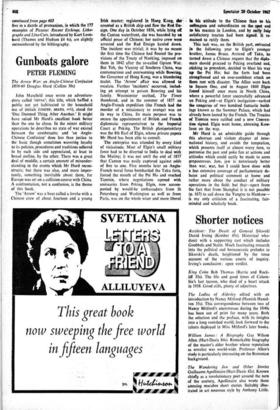The Arrow War: an Anglo-Chinese Confusion 1856 - 60 Douglas Hurd (Collins
30s)
Gunboats galore
PETER FLEMING
John Masefield once wrote an adventure- story called `coma'; this title, which baffled a public not yet habituated to the household use of initials (UNICEF, micro, KrA), stood for `One Damned Thing After Another.' It might have suited Mr Hurd's excellent book better than the one he chose. In the minor military operations he describes no state of war existed between the combatants; and 'an Anglo- Chinese Confusion' does less than justice to the basic though sometimes wavering loyalty to its policies, procedures and traditions adhered to by each side and appreciated, at least in broad outline, by the other. There was a great deal of muddle, a certain amount of misunder- standing in the events which Mr Hurd recon- structs; but there was also, and more impor- tantly, something inevitable about them, for Europe was set on a collision-course with China. A confrontation, not a confusion, is the theme of this book.
The `Arrow' was a boat called a lorcha with a Chinese crew of about fourteen and a young
Irish master; registered in Hong Kong, she counted as a British ship and flew the Red En- sign. One day in October 1856, while lying of the Canton waterfront, she was boarded by an official posse of Chinese; her native crew were arrested and the Red Ensign hauled down. The incident was trivial; it was by no means the first time the Chinese had flouted the pro- visions of the Treaty of Nanking, imposed on them in 1842 after the so-called Opium War. But Yeh, the Viceroy of Southern China, was contumacious and overweening while Bowring, the Governor of Hong Kong, was a blundering zealot. The 'Arrow' affair was allowed to escalate. Further 'incidents' occurred, includ- ing an attempt to poison Bowring and his family. Westminster seethed, The Times thundered, and in the summer of 1857 an Anglo-French expedition (the French had the murder of a missionary to avenge) was on its way to China. Its main purpose was to secure the appointment of British and French diplomatic representatives to the Imperial Court at Peking. The British plenipotentiary was the 8th Earl of Elgin, whose private papers Mr Hurd has been able to consult.
The enterprise was attended by every kind of vicissitude. Most of Elgin's small military force had to be diverted to India to deal with the Mutiny; it was not until the end of 1857 that Canton was easily captured against odds of five to one. Five months later an Anglo- French naval force bombarded the Taku forts, forced the mouth of the Pei Ho and reached Tientsin, where negotiations opened with emissaries from Peking. Elgin, now accom- panied by would-be ambassadors from St Petersburg and Washington as well as from Paris, was on the whole wiser and more liberal in his attitude to the Chinese than le his oolleagues and subordinates on the spot and to his masters in London, and by early July satisfactory treaties had been signed. It re- mained- to ratify them.
This task was, on the British part, entrusted in the following year to Elgin's younger brother, James Bruce. Arrived off Taku, he turned down a Chinese request that the diplo- mats should proceed to Peking overland and, sticking to precedent, decided to blast his way up the Pei Ho; but the forts had been strengthened and an over-confident attack on them met with disaster. The Allies were back to Square One, and in August 1860 Elgin found himself once more in North China, where a powerful force successfully advanced on Peking and—at Elgin's instigation—sacked the congeries of two hundred fantastic build- ings known as the Summer Palace, which had already been looted by the French. The Treaties of Tientsin were ratified and a new Conven- tion signed. Elgin went home, annexing Kow- loon on the way.
Mr Hurd is an admirable guide through this abstruse and violent chapter of inter- national history, and avoids the temptation, which presents itself at almost every turn, to patronise the past and poke fun at actions and attitudes which could easily be made to seem preposterous. Jaw, jaw is notoriously better than war, war, but I could have done with a less extensive coverage of parliamentary de- bates and political comment at home and rather more about the conduct of military operations in the field; but that—apart from the fact that from Shanghai it is not possible (p. 167) to sail down the Yangtse to Hankow- is my only criticism of a fascinating, fair- minded and scholarly book.


































 Previous page
Previous page